Related Research Articles

Bangladesh, officially the People's Republic of Bangladesh, is a country in South Asia. It is the eighth-most populous country in the world, with a population exceeding 163 million people in an area of either 148,460 square kilometres (57,320 sq mi) or 147,570 square kilometres (56,980 sq mi), making it one of the most densely populated countries in the world. Bangladesh shares land borders with India to the west, north, and east, and Myanmar to the southeast; to the south it has a coastline along the Bay of Bengal. It is narrowly separated from Nepal and Bhutan by the Siliguri Corridor; and from China by 100 km of the Indian state of Sikkim in the north. Dhaka, the capital and largest city, is the nation's economic, political, and cultural hub. Chittagong, the largest seaport, is the second-largest city. The official language is Bengali, one of the most eastern branches of the Indo-European language family.

Civilisational history of Bangladesh previously known as East Bengal, dates back over four millennia, to the Chalcolithic. The country's early documented history featured successions of Hindu and Buddhist kingdoms and empires, vying for regional dominance.

Sheikh Mujibur Rahman, often shortened as Sheikh Mujib or Mujib and widely known as Bangabandhu was a Bangladeshi politician, statesman and Founding Father of Bangladesh who served as the first President and later as the Prime Minister of Bangladesh from April 1971 until his assassination in August 1975. Mujib is credited with leading the successful campaign for Bangladesh's independence from Pakistan. He is revered in Bangladesh with the honourific title of "Bangabandhu" which is used around the world. He was a founding member and eventual leader of the Awami League, founded in 1949 as an East Pakistan–based political party in Pakistan. Mujib is considered to have been a fundamental figure in the efforts to gain political autonomy for East Pakistan and later as the central figure behind the Bangladesh Liberation Movement and the Bangladesh Liberation War in 1971. Thus, he is regarded as the "Jatir Janak" or "Jatir Pita" of Bangladesh. His daughter Sheikh Hasina is the current leader of the Awami League and currently serves as the Prime Minister of Bangladesh.

Chittagong, officially Chattogram, is the second-largest city in Bangladesh. It is the administrative seat of the eponymous division and district. It hosts the busiest seaport on the Bay of Bengal. The city is located on the banks of the Karnaphuli River between the Chittagong Hill Tracts and the Bay of Bengal. The Greater Chittagong Area had a population of more than 5.2 million in 2022. In 2021, the city proper had a population of more than 8.7 million.

Islam is the state religion of the People's Republic of Bangladesh. As per 2011 census, Bangladesh recorded a population of 149,772,364 people, of which the Muslim population was approximately 135,394,217, constituting an overwhelming 90.4% of the country's population, making Bangladesh the third-largest Muslim majority nation in the world after Indonesia and Pakistan. The majority of Bangladeshis are Sunni, and follow the Hanafi school of fiqh. Religion is an integral part of Bangladeshi identity. Despite being a Muslim-majority country, Bangladesh is a de facto secular state.

The Chakma people are a tribal group from the eastern-most regions of the Indian subcontinent. They are the largest ethnic group in the Chittagong Hill Tracts region of southeastern Bangladesh, and the second-largest in Mizoram, India. Other places in Northeast India also have significant Chakma populations. Around 60,000 Chakma people live in Arunachal Pradesh, India; a first generation migrated there in 1964 after the Kaptai Dam tragedy. Another 79,000 Chakmas live in Tripura, India, and 20,000-30,000 in Assam, India.

The history of Bengal is intertwined with the history of the broader Indian subcontinent and the surrounding regions of South Asia and Southeast Asia. It includes modern-day Bangladesh and the Indian states of West Bengal and Assam's Karimganj district, located in the eastern part of the Indian subcontinent, at the apex of the Bay of Bengal and dominated by the fertile Ganges delta. The region was known to the ancient Greeks and Romans as Gangaridai, a powerful kingdom whose war elephant forces led the withdrawal of Alexander the Great from India. Some historians have identified Gangaridai with other parts of India. The Ganges and the Brahmaputra rivers act as a geographic marker of the region, but also connects the region to the broader Indian subcontinent. Bengal, at times, has played an important role in the history of the Indian subcontinent.

Bengalis, also rendered as Bangalee or the Bengali people, are an Indo-Aryan ethnolinguistic group originating from and culturally affiliated with the Bengal region of South Asia. The native population is divided between the independent country Bangladesh and the Indian states of West Bengal, Tripura, Assam's Barak Valley and parts of Manipur. Most of them speak Bengali, a language from the Indo-Aryan language family.
Mahbubul Alam was a Bangladeshi writer. He won Bangla Academy Literary Award in 1965 and Ekushey Padak in 1978.
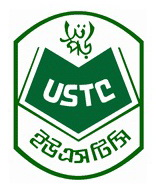
University of Science & Technology Chittagong (USTC) is a private university located in Chittagong, Bangladesh. At first, it was established with the sponsorship of a private charity on May 13, 1989. Later it was upgraded to USTC as a full phased university under the Private University Act of 1992.
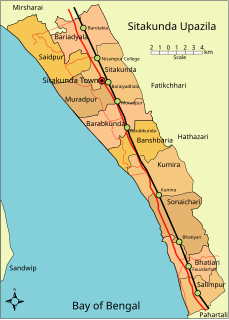
Sitakunda is an upazila, or administrative unit, in the Chittagong District of Bangladesh. It includes one urban settlement, the Sitakunda Town, and 10 unions, the lowest of administrative units in Bangladesh. It is one of the 15 upazilas, the second tier of administrative units, of the Chittagong District, which also includes 33 thanas, the urban equivalent of upazilas. The district is part of the Chittagong Division, the highest order of administrative units in Bangladesh. Sitakunda is the home of the country's first eco-park, as well as alternative energy projects, specifically wind energy and geothermal power.
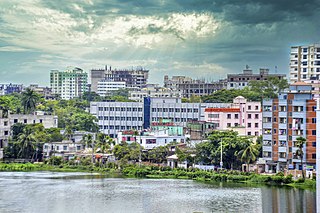
Comilla, officially spelled Cumilla from April 2018, is a city in the Chittagong Division of Bangladesh, located along the Dhaka-Chittagong Highway. It is the administrative centre of the Comilla District, part of the Chittagong Division. The name Comilla was derived from Komolangko (কমলাঙ্ক), meaning the pond of lotus.
Swadhin Bangla Betar Kendra was the radio broadcasting centre of Bengali nationalist forces during the Bangladesh Liberation War in 1971. This station played a vital role in liberation struggle, broadcasting the Declaration of Independence and increasing the morale of Bangladeshis during the war. In 1971, radio was the only media reaching to the far ends of Bangladesh. It ran a propaganda campaign through the war. Mr Sufi barkat-e-khoda was one of the personalities of the show.

Bangladesh Jamaat-e-Islami, previously known as Jamaat-e-Islami Bangladesh, or Jamaat for short, was the largest Islamist political party in Bangladesh. On 1 August 2013, the Bangladesh Supreme Court declared the registration of the Bangladesh Jamaat-e-Islami illegal, ruling that the party is unfit to contest national elections.
Bangladeshi nationalism is an ideology that promotes the territorial identity of Bangladeshis. The ideology emerged during the late 1970s, popularized by former Bangladesh President Ziaur Rahman. The history of nationalism in the country dates back to the colonial era, when the region started witnessing anti-colonial movements against the British Empire. Soon, a sense of religious nationalism began to emerge which was later revolutionised into ethnolinguistic nationalism. Following independence of Bangladesh in 1971, leaders like Ziaur Rahman began to promote Bangladeshi nationalism which was based on territorial attachment of Bangladeshis. Politically, Bangladeshi nationalism is mainly professed by the center-right and rightist political parties in Bangladesh, led by Bangladesh Nationalist Party.
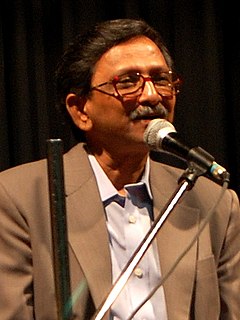
Bimal Guha is a Bangladeshi poet. He appeared on the Bangladesh literary scene in the 1970s. His themes revolve around the war of liberation and the eternal subjects of love, nature, motherland, mother-tongue, tradition, and modernity.
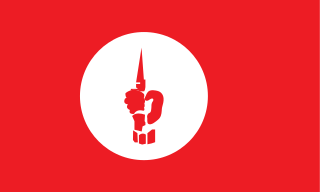
The Mukti Bahini, also known as the Bangladesh Forces, was the guerrilla resistance movement consisting of the Bangladeshi military, paramilitary and civilians during the War of Liberation that transformed East Pakistan into Bangladesh in 1971. An earlier name Mukti Fauj was also used.

Bengali Muslims are adherents of Islam who ethnically, linguistically and genealogically identify as Bengalis. Comprising about two-thirds of the global Bengali population, they are the second-largest ethnic group among Muslims after Arabs. Bengali Muslims make up the majority of Bangladesh's citizens, and are the largest minority in the Indian states of West Bengal and Assam

Syed Ahmad Ullah Maizbhandari was a Bengali Sufi saint and founder of Maizbhandaria; the first Sufi order to originate in Bengal.

The Greater Noakhali region predominantly includes the districts of Noakhali, Feni and Lakshmipur in Bangladesh, though it has historically also included Bhola, Mirsarai, Sandwip and some southern parts of Tripura in India and southern Comilla. The history of the Noakhali region begins with the existence of civilisation in the villages of Shilua and Bhulua. Bhulua became a focal point during the Buddhist and Hindu kingdoms of Pundra, Harikela and Samatata leading it to become the initial name of the region as a whole. The medieval Kingdom of Bhulua enjoyed autonomy under the Twipra Kingdom and Bengal Sultanate before being conquered by the Mughal Empire. At the beginning of the 17th century, Portuguese pirates led by Sebastian Gonzales took control of the ara but were later defeated by Governor Shaista Khan. Affected by floodwaters, the capital of the region was swiftly moved to a new place known as Noakhali, from which the region presently takes its name. By 1756, the British East India Company had dominated and started to establish several factories in the region. The headquarters was once again moved in 1951, to Maijdee, as a result of Noakhali town vanishing due to fluvial erosion.
References
- ↑ Harder, Hans (2011). Sufism and Saint Veneration in Contemporary Bangladesh: The Maijbhandaris of Chittagong. Routledge. p. 11. ISBN 978-1-136-83189-8.
- ↑ Gommans, Jos J. L.; Leider, Jacques (2002). The Maritime Frontier of Burma: Exploring Political, Cultural and Commercial Interaction in the Indian Ocean World, 1200-1800. KITLV Press. p. 211. ISBN 978-90-6718-190-7.
- ↑ Journal of the Department of Pali. University of Calcutta. 2003. p. 43.
- 1 2 3 Qureshi, Mahmud Shah. "Alam, Ohidul". Banglapedia. Retrieved 6 December 2017.